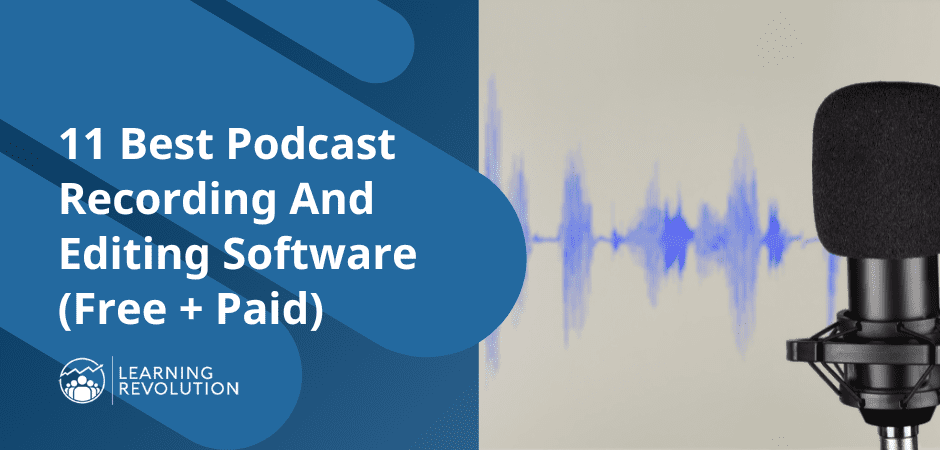

We’ll let you in on a little secret.
The words you say in a podcast, the script you follow, the guests you invite, and the stories you tell don’t make a great podcast on their own.
To transform your raw podcast recording into unforgettable content that sticks in your listeners’ minds for years, you must polish it using the best podcast editing software.
All professional podcasters do that.
But with so many options, which editing software should you choose?
In this article, we’ll tell you about some of the best free and paid podcast recording and editing software. This is largely based on our experience running both the Learning Revolution Podcast and the Leading Learning Podcast, co-hosted by our founder, Jeff Cobb.
This software list ranges from simple tools for quick fixes to complete audio studios that can transform your messy first drafts into masterpieces.
Excited? Let’s jump in.
Our Picks For The Best Free And Paid Podcast Recording Software
We’ve got some pretty impressive podcast recording and editing tools listed in this article. But if you’re looking for quick recommendations, here’s our verdict.
- Best Overall – Adobe Audition
- Best For Advanced Podcasters – Pro Tools
- Best Free Podcast Recording Tool – Audacity
- Best Cloud Podcast Editing Tool – Riverside
These are our picks. But we recommend you read about the other tools on our list because they all offer unique features and solutions you might be looking for. Make sure to also see our top picks for a podcast hosting platform.
Digital Audio Workstation (DAW) vs. Audio Editors | Understand The Differences
Before discussing specific tools, we must first understand the two main types of podcast recording and editing software – Digital Audio Workstations and Audio Editors.
Without knowing these types, you won’t be able to choose the best fit for your business needs.
Digital Audio Workstations (DAW)
Digital Audio Workstations (DAW) are software for handling the complete podcast recording and editing cycle, giving you advanced tools to enhance your content.
DAWs are designed for musicians, so you technically don’t need them for podcasts. However, modern podcasts are incomplete without effects and require various editing features like mixing and mastering to produce engaging content.
DAWs use track-based workflows meaning each speaker’s audio is stored in different tracks. This makes it easier to independently edit or enhance the audio for each track.
This is why most professional podcasters prefer DAWs over regular audio editors.
However, DAWs have a steeper learning curve and are more expensive than plain audio editors.
Audio Editors
Plain audio editors give you basic editing options like cropping, trimming, and copy/pasting. They’re easier to learn and are often available for free.
However, simple audio editors use a session-based workflow, meaning all the sounds are recorded in the same file. This limits your ability to edit and enhance your content and doesn’t give you the same freedom as a DAW.
But that doesn’t mean audio editors aren’t useful. In fact, for most day-to-day podcast editing tasks, audio editors are the more convenient option and are ideal for beginners.
So, if you want to record high-quality audio podcasts with multiple guests, sound effects, background music, or multiple tracks, and have the budget and expertise for it, go for a DAW.
But if you’re a beginner or only want to trim and crop your audio files, regular audio editors are enough for your needs.
The Best Free Podcast Recording And Editing Software
If you’re looking for beginner-friendly free podcast editing software, here are some great options.
1. Audacity
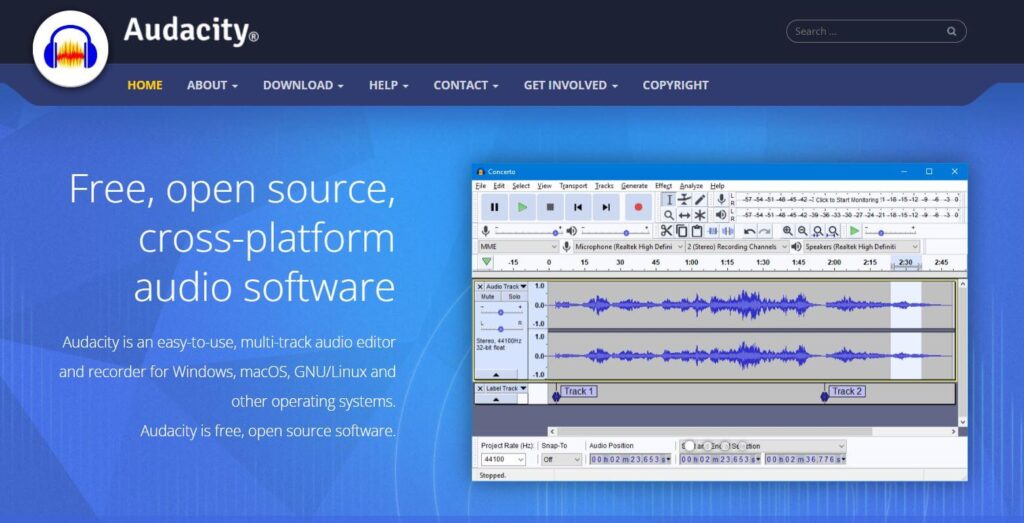

Ask any podcaster about their first audio editing software, and Audacity will usually be the answer.
It’s a free, open-source DAW with everything you need to record and edit podcasts as a beginner.
Don’t be fooled by its outdated user interface, one of its few weaknesses. Audacity offers more with its free software than many premium tools. It has thousands of users worldwide and a vibrant community, continually developing new plugins and tools, making it more useful for podcasters.
Audacity works with any mic or mixer and allows you to create multi-track recordings in 16-bit and higher sample rates. It has a basic but useful interface that shows you recording volume levels and allows you to cut/paste or trim your audio files easily.
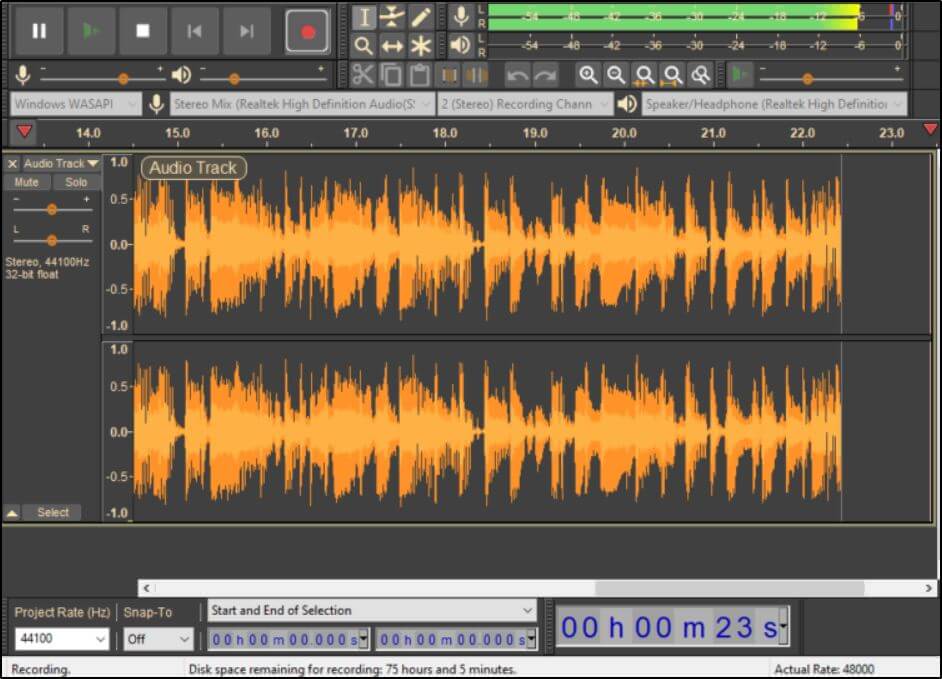

Overall, Audacity is among the best free podcast recording and editing options and should undoubtedly be at the top of your list if you need robust features without spending a fortune.
Audacity’s Best Podcast Recording And Editing Features
- 16-bit, 24-bit, and 32-bit recordings directly from microphones and mixers.
- Noise and hiss reduction
- Pitch editor
- Multiple plugins to add new capabilities.


2. Sound Forge Pro
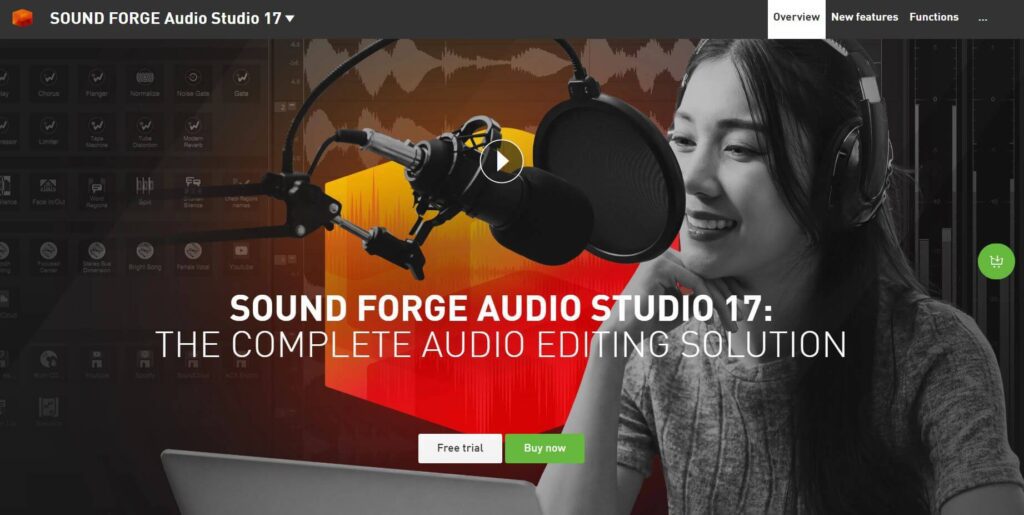

Sound Forge Pro isn’t exactly a free tool, but it comes with a 30-day free trial. So, if you’re looking for a free and robust audio editor for a limited time, it’s a great option.
Professional podcasters, musicians, and editors have been using Sound Forge for nearly three decades, and it’s still an immensely popular tool with a large community of dedicated users.
It allows you to record 64-bit audio on up to 32 channels and provides editing options like cutting, trimming, noise reduction, pitch modification, and several advanced audio filters.
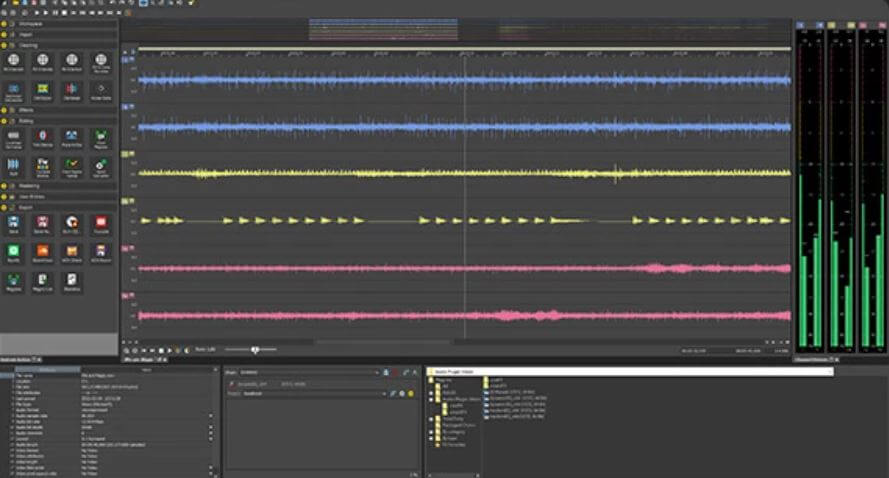

Despite not being a DAW in the true sense, Sound Forge provides you with a robust set of options sufficient for most podcast creators.
Sound Forge Pro’s Best Podcast Recording And Editing Features
- Multi-channel recording
- Hi-res audio recording of up to 64-bit sample rates of up to 768 kHz.
- Automatic recording timer
- AI voice detection to automatically highlight speech in music
- Loudness normalization
- DeHisser to evenly remove hiss from your recordings.
- Recording presets and workflows.


3. Garage Band
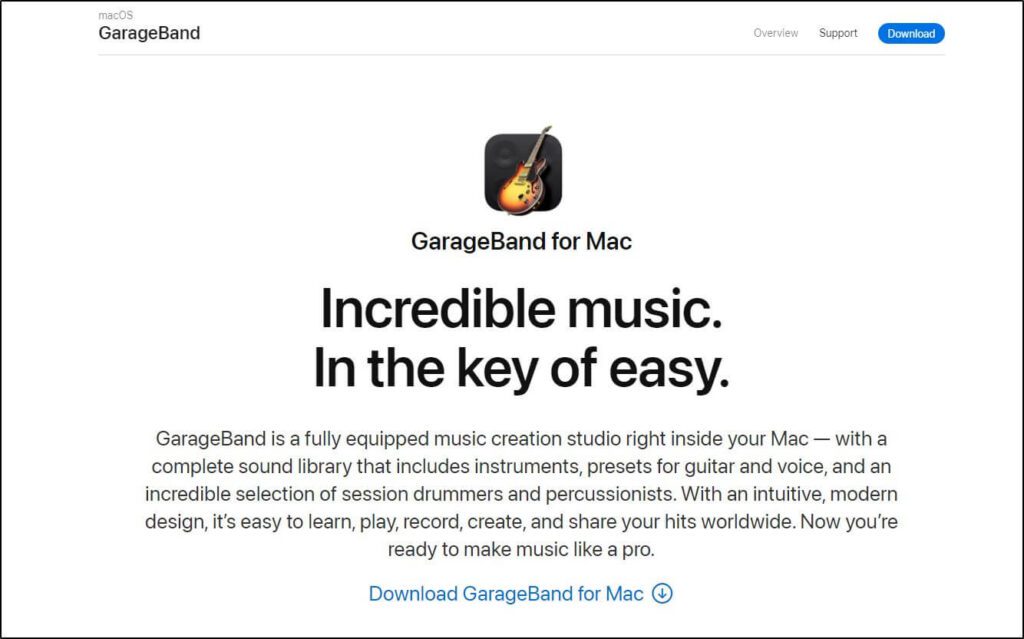

Apple created GarageBand for musicians to easily record, edit, mix, and master their songs. However, it has become one of the top podcast recording and editing tools because it’s free forever and has all the features for high-quality podcast editing.
GarageBand allows you to record from various hardware, edit multi-track podcasts, and mix master your content.
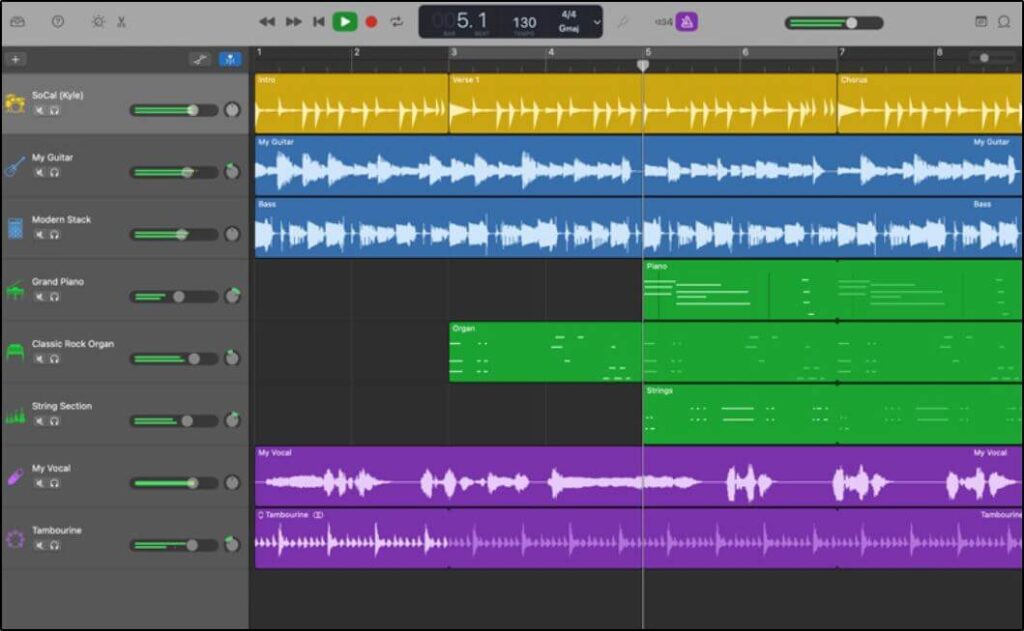

You can add sound effects, background music, control volume levels, add or remove content sections, and edit your audio in various other ways.
So, if you’re an Apple user looking for the best free podcast editing software, GarageBand is your best choice.
GarageBand’s Best Podcast Recording And Editing Features
- Allows you to automate the levels and effects of individual tracks
- Apply compression to bring consistency to the volume of all tracks
- Use reverb, echo, and delay effects.
- Advanced noise and hiss reduction to improve speech clarity without compromising audio quality.
- Mastering Suite to polish your podcast before publishing.


4. Veed.io
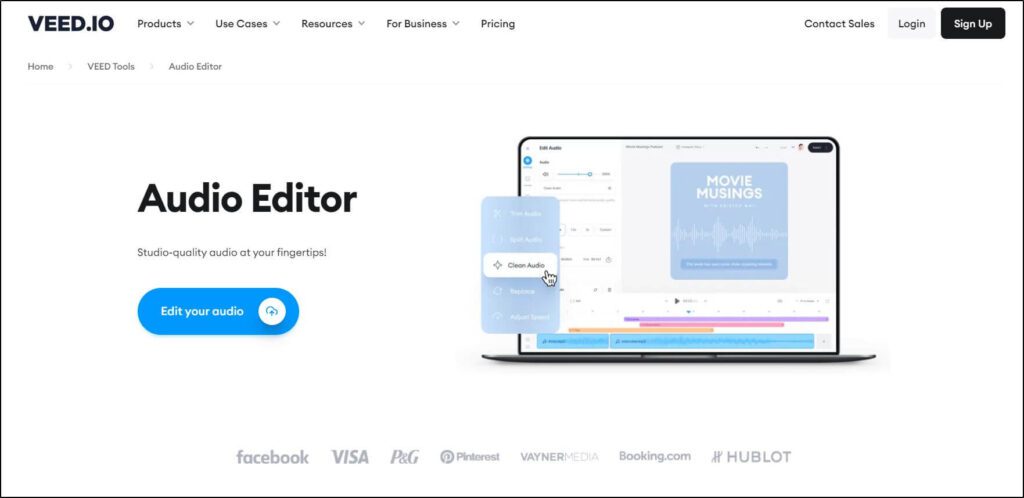

If you’re looking for a simple and easy-to-use audio editor to make quick changes to your podcast, like trimming or copy/pasting, Veed is the perfect tool.
Veed is a cloud tool designed for video podcasters and content creators. But it also offers several free tools, including a pretty helpful audio editor.
It works in the browser, so you don’t need to download or install any software to use Veed’s audio editor.
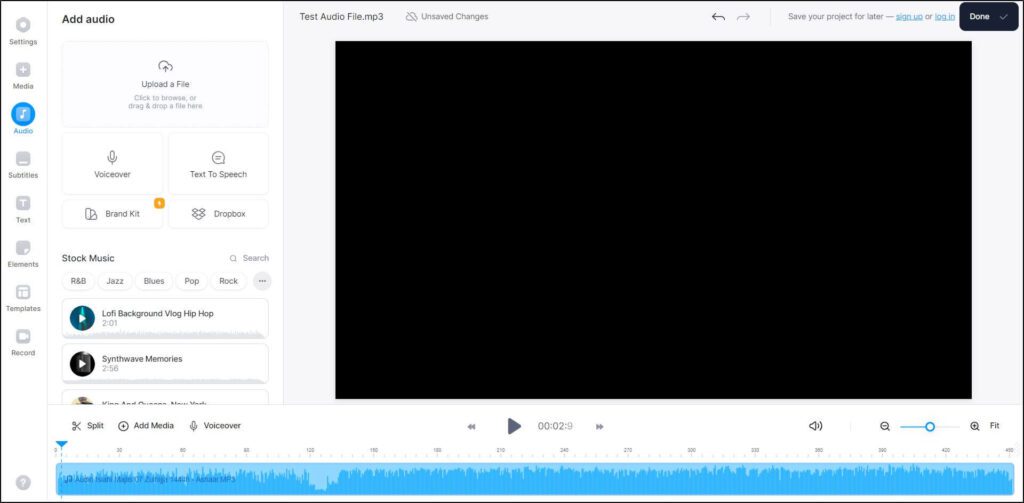

Plus, its drag & drop interface makes it one of the best tools from a user experience perspective.
Veed’s Best Podcast Recording And Editing Features
- Cut and trim audio files
- Save as MP3, WAV, FLAC, and several other formats.
- Audio effects library
- Presets for different audio types.


The Best Paid Podcast Recording And Editing Software
Free tools are great for quick fixes but don’t offer the versatility and advanced features of premium audio recording and editing tools.
So, if you want to transform your podcasts with professional audio editing, here are the tools you should try.
1. Adobe Audition
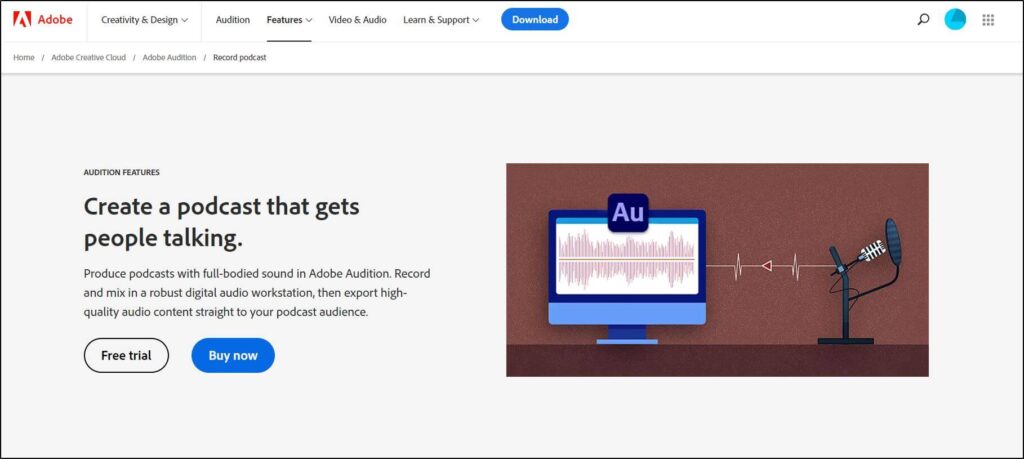

Ask any podcaster or audio editing professional about their top three favorite software, and Adobe Audition will always be on their list.
It has been among the most popular DAWs for the last two decades and offers some of the best podcast editing and recording features, including a wide range of audio filters, sound effects, best-in-class noise, and hiss reduction, and excellent pitch modification features.
Audition is a professional-grade DAW with numerous audio editing features. So, it can be overwhelming to navigate its options.
To simplify your job, Audition has a dedicated Podcast view that displays the most relevant options for podcast editing.
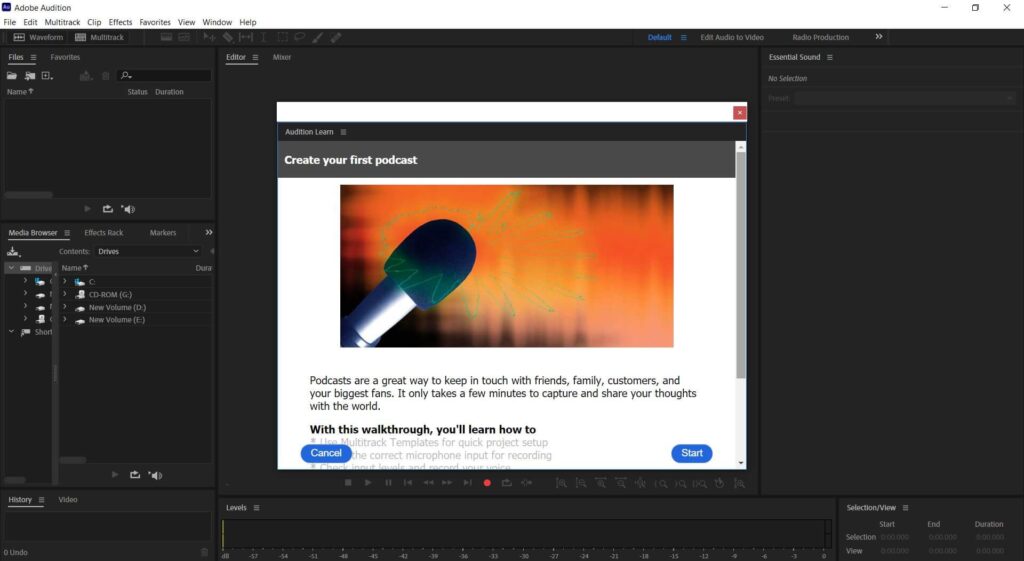

In addition, it has a step-by-step tutorial that helps you set up, record, edit, and export your first podcast.
You can use its Podcast presets to quickly set up your recording environment and benefit from its audio library to find music and effects for all kinds of content themes.
If you record video podcasts, you can easily connect Audition with Adobe Premiere to create separate video and audio files from the same source.
Or, if you already have video podcasts you want to convert into audio or edit as audio, you can open them directly in Adobe Audition.
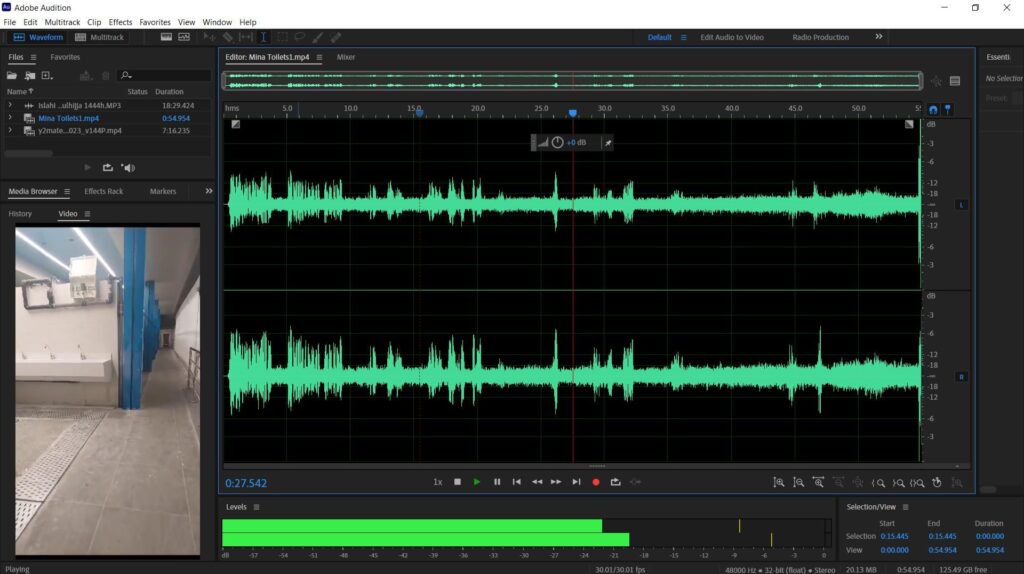

In short, if you want the ultimate audio recording and editing solution, there aren’t many better tools than Adobe Audition.
Audition’s Best Podcast Recording And Editing Features
- Multi-track recording and editing
- Waveform and multitrack views
- Multiple project windows that you can switch easily
- Amplification, reverb, echo, delay, multitap delay, full chamber echo, fade, and other effects
- Extracts audio directly from video files without conversion
- Advanced EQ and pitch bending
- 20+ file export formats
- Works with professional mics and mixers for direct recording


2. Pro Tools
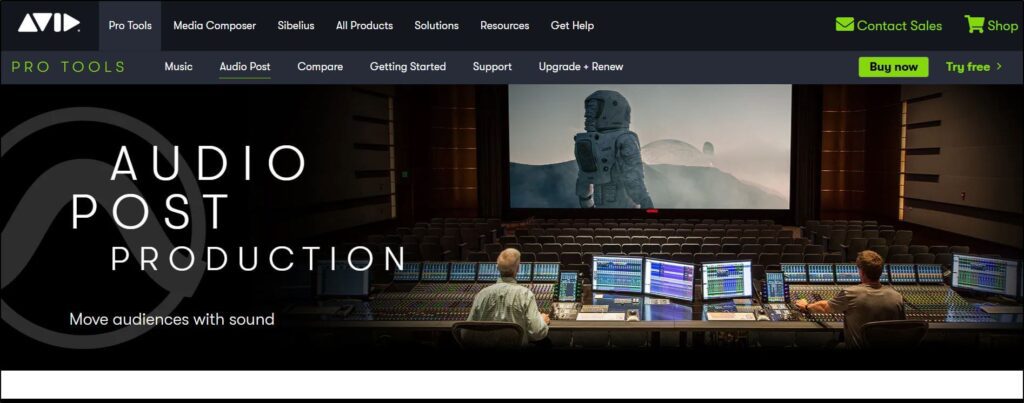

If you’re running a large podcast business or want to set up a professional studio with the best audio production hardware and software, ProTools should be your DAW.
It is the most advanced audio production suite designed for every possible audio production use case, including podcasts.
For most beginners and even experienced podcasters, ProTools is a bit overkill, with too many features and advanced options that you’d rarely need.
Still, if you like experimenting with different sound effects or have a post-production team to manage your podcast editing, ProTools is worth using.
Audacity’s Best Podcast Recording And Editing Features
- Multitrack recording and editing.
- Automated volume adjustment, noise detection, and amplification
- Export in numerous RAW and end-user formats.
- Trimming, cropping, cutting, pasting, and mixing
- Fading, pitch bending, and advanced sound filter
- Stock library


3. Riverside
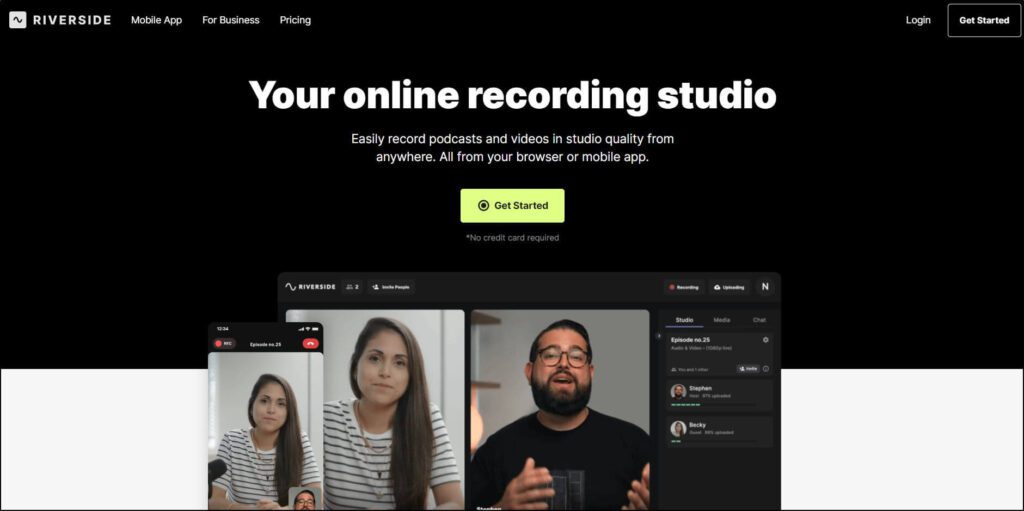

If you’re looking for a cloud podcast recorder and editor you can access in your browser from any device, Riverside is a great option.
It is tailor-made for video and audio podcasters and caters to all levels of podcasting complexities. This is why celebrity podcasters like Tim Ferris and Garry Vee use it for their shows.
Riverside records your video and audio content separately, allowing you to use them as separate podcasts. It lets you record crisp audio from any mic system linked to your computer or smartphone.
To help you polish your content, Riverside has an audio editor with multi-track editing, noise reduction, and AI-backed equalization capabilities. However, it is less robust than Audition or ProTools because it is a text-based audio editor with limited audio enhancement features.
Let us explain.
Riverside uses AI to generate your audio transcript. You can edit this transcript, and the audio reflects the changes. However, this approach has several limitations. For example, it is tedious to use text-based editing for a long podcast.
However, compared to the other editors in this list, Riverside stands out for its ease of use and attractive user interface. It not only looks modern but also offers drag & drop features to help you quickly create and modify your content the way you want.
Riverside’s Best Podcast Recording And Editing Features
- Uses AI to generate podcast transcripts from your audio and video content
- As you edit the AI-generated transcript, the changes are reflected in your audio
- Live audio and video podcasts with up to 8 participants
- Excellent recording quality even on slow or internet connections (because of local device recording)
- Allows direct sharing to various podcast platforms and social networks
- Universal access link for your audience to join your show live


4. LogicPro
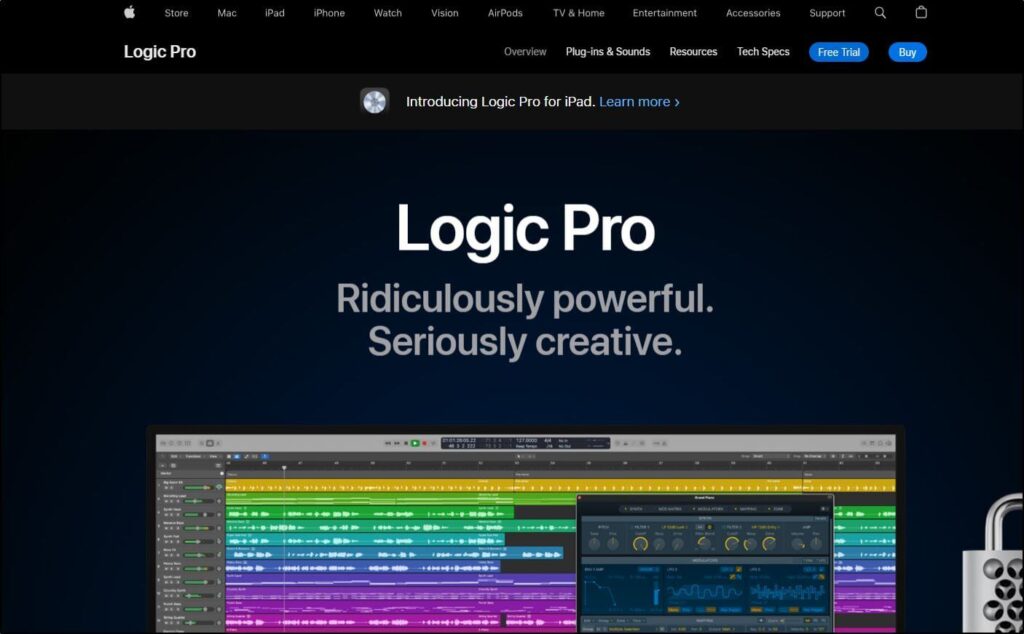

Logic Pro is the first choice DAW for most Mac users. It is a perfectly designed audio editing studio that enables you to polish your podcasts through professional-grade recording and editing on your Mac computer.
Its processing speeds are better than most other tools in this category, which means you can also easily use it with entry-level Macs.
With Logic Pro, you can do everything expected from a DAW.
From basic editing, cutting, pasting, and cropping to mixing tracks, adding background sounds, using effects, or removing noise and hiss, Logic Pro does a flawless job.
Logic Pro’s Best Podcast Recording And Editing Features
- Multi-track recording and editing
- Excellent noise and hiss reduction feature
- Low file sizes without losing quality
- Automated volume balancing
- Mixing and mastering features
- Seamless integration with Apple products like GarageBand and others


5. Auphonic
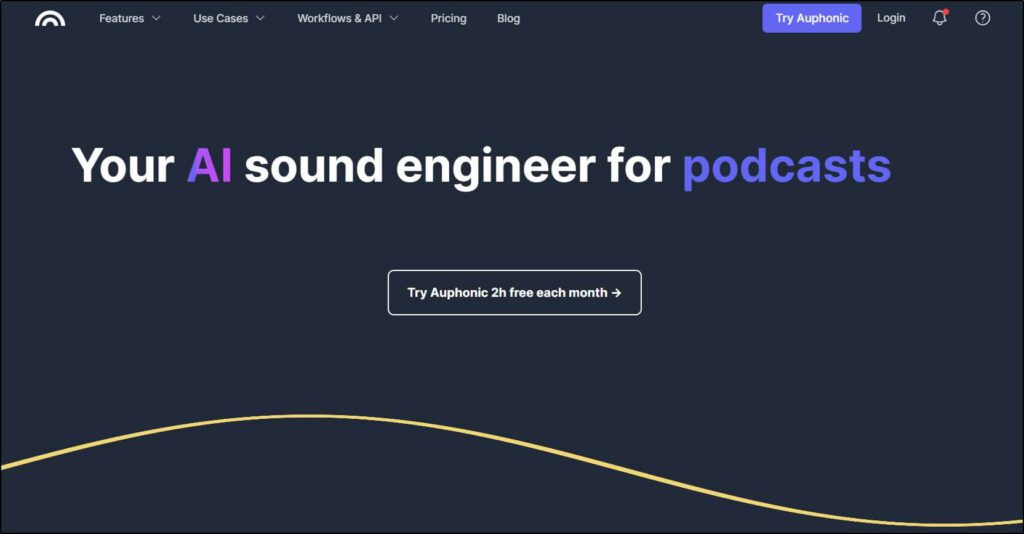

Auphonic is a cloud audio editor for podcasts. It’s not as powerful as Logic Pro or Audition. But that’s not its purpose.
It’s designed to help beginners edit audio podcasts using AI and other advanced editing features. They’re the exact features you’ll find in many DAWs. But Auphonic’s results aren’t as polished.
Still, it’s an excellent application if you don’t need extensive editing and only want a tool to quickly improve your content.
Auphonic’s Best Podcast Recording And Editing Features
- Automatic volume leveler
- AI-powered multi-track audio processing
- Noise and reverb remover
- Loudness customizer that allows you to amplify your audio
- Automated silence cutter


6. Hindenburg Pro
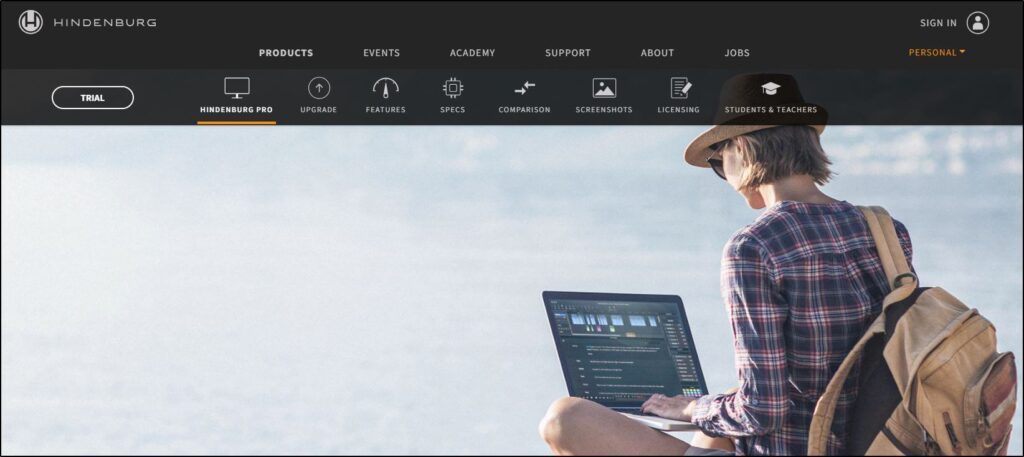

Hindenburg Pro is specifically designed for journalists, podcasters, and interviewers. This is why it has been the favorite audio editor of journalists for years.
They’ve recently improved their user interface and features to cater to the needs of modern podcasters as well. As a result, it offers several advanced editing features like mixing, background effects, and multi-track editing.
Hindenburg is designed for professionals. But its clean user interface and easy-to-navigate features make it an excellent tool for mid-tier podcasters as well.
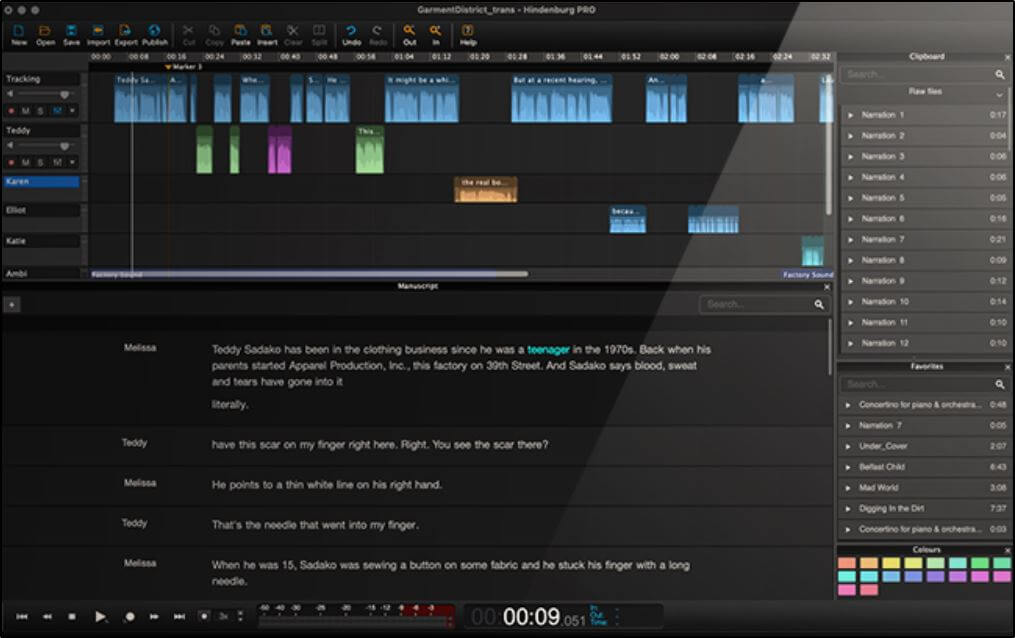

With everything it offers, Hindenburg simplifies audio editing even for non-technical users. So, if most of your podcasts are based on interviews or storytelling, give Hindenburg a try.
Hindenburg’s Best Podcast Recording And Editing Features
- Automatic mic and handset detection to activate the relevant preset
- Automatic transcription
- Text-based audio editing allows you to find relevant sections easily


7. Podcastle
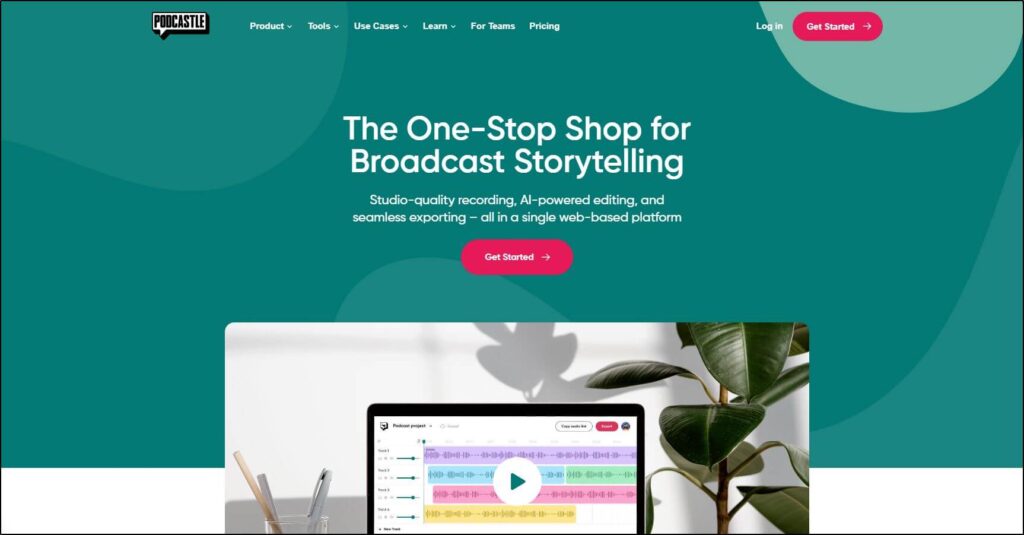

Podcastle is one of the most impressive cloud audio editors for podcasters and content creators. It not only has a modern user interface but also has all the right features to help podcasters quickly edit, enhance, and polish their content.
Podcastle allows you to run live and recorded podcasts in excellent audio quality, irrespective of your internet connection. It makes this possible by storing your recordings in the cloud.
It comes with advanced multi-track recording capabilities meaning it records every significant sound source in a separate track. Its audio editor has a drag & drop user interface using which you can easily cut/paste, trim, or crop audio segments from different tracks.
In addition, it has excellent AI-powered noise removal and volume leveling functions that help you clear any unnecessary sounds from your recordings and make them more professional.
Overall, Podcastle is an impressive product for editing and improving your podcasts.
Podcastle’s Best Podcast Recording And Editing Features
- Create a digital copy of your voice and create AI-powered text-to-speech content in your voice
- Audio transcription
- AI-power noise cancellation
- Use its text-based audio editor to quickly find specific words and sections
- Merge tracks or edit them separately
- Real-time cloud storage


Ready To Create World Class Podcasts?
Whether you’re a beginner podcaster or an expert with years of experience, you need the right recording and editing tools to create professional podcasts.
The tools we’ve shared in this article are designed for different levels of podcast expertise. So, not all of them are the right fit for your business.
If you’re a beginner, go for the cloud audio editors we’ve mentioned because they’re easier to use. However, you’ll probably want a specialized DAW for your content if you’ve been podcasting for a while.
So, shortlist the ones you like and sign up for their free trials to see if they offer the features you want.
If you have any questions, shoot them in the comments section.
Table of Contents



